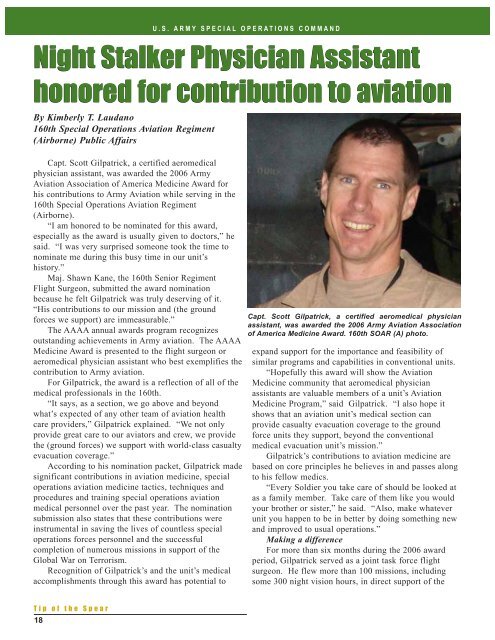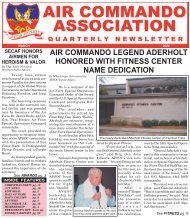tip of the spear (pdf) - The Air Commando Association
tip of the spear (pdf) - The Air Commando Association
tip of the spear (pdf) - The Air Commando Association
Create successful ePaper yourself
Turn your PDF publications into a flip-book with our unique Google optimized e-Paper software.
By Kimberly T. Laudano<br />
160th Special Operations Aviation Regiment<br />
(<strong>Air</strong>borne) Public Affairs<br />
Capt. Scott Gilpatrick, a certified aeromedical<br />
physician assistant, was awarded <strong>the</strong> 2006 Army<br />
Aviation <strong>Association</strong> <strong>of</strong> America Medicine Award for<br />
his contributions to Army Aviation while serving in <strong>the</strong><br />
160th Special Operations Aviation Regiment<br />
(<strong>Air</strong>borne).<br />
“I am honored to be nominated for this award,<br />
especially as <strong>the</strong> award is usually given to doctors,” he<br />
said. “I was very surprised someone took <strong>the</strong> time to<br />
nominate me during this busy time in our unit’s<br />
history.”<br />
Maj. Shawn Kane, <strong>the</strong> 160th Senior Regiment<br />
Flight Surgeon, submitted <strong>the</strong> award nomination<br />
because he felt Gilpatrick was truly deserving <strong>of</strong> it.<br />
“His contributions to our mission and (<strong>the</strong> ground<br />
forces we support) are immeasurable.”<br />
<strong>The</strong> AAAA annual awards program recognizes<br />
outstanding achievements in Army aviation. <strong>The</strong> AAAA<br />
Medicine Award is presented to <strong>the</strong> flight surgeon or<br />
aeromedical physician assistant who best exemplifies <strong>the</strong><br />
contribution to Army aviation.<br />
For Gilpatrick, <strong>the</strong> award is a reflection <strong>of</strong> all <strong>of</strong> <strong>the</strong><br />
medical pr<strong>of</strong>essionals in <strong>the</strong> 160th.<br />
“It says, as a section, we go above and beyond<br />
what’s expected <strong>of</strong> any o<strong>the</strong>r team <strong>of</strong> aviation health<br />
care providers,” Gilpatrick explained. “We not only<br />
provide great care to our aviators and crew, we provide<br />
<strong>the</strong> (ground forces) we support with world-class casualty<br />
evacuation coverage.”<br />
According to his nomination packet, Gilpatrick made<br />
significant contributions in aviation medicine, special<br />
operations aviation medicine tactics, techniques and<br />
procedures and training special operations aviation<br />
medical personnel over <strong>the</strong> past year. <strong>The</strong> nomination<br />
submission also states that <strong>the</strong>se contributions were<br />
instrumental in saving <strong>the</strong> lives <strong>of</strong> countless special<br />
operations forces personnel and <strong>the</strong> successful<br />
completion <strong>of</strong> numerous missions in support <strong>of</strong> <strong>the</strong><br />
Global War on Terrorism.<br />
Recognition <strong>of</strong> Gilpatrick’s and <strong>the</strong> unit’s medical<br />
accomplishments through this award has potential to<br />
Tip <strong>of</strong> <strong>the</strong> Spear<br />
18<br />
U.S. ARMY SPECIAL OPERATIONS COMMAND<br />
Night Stalker Physician Assistant<br />
honored for contribution to aviation<br />
Capt. Scott Gilpatrick, a certified aeromedical physician<br />
assistant, was awarded <strong>the</strong> 2006 Army Aviation <strong>Association</strong><br />
<strong>of</strong> America Medicine Award. 160th SOAR (A) photo.<br />
expand support for <strong>the</strong> importance and feasibility <strong>of</strong><br />
similar programs and capabilities in conventional units.<br />
“Hopefully this award will show <strong>the</strong> Aviation<br />
Medicine community that aeromedical physician<br />
assistants are valuable members <strong>of</strong> a unit’s Aviation<br />
Medicine Program,” said Gilpatrick. “I also hope it<br />
shows that an aviation unit’s medical section can<br />
provide casualty evacuation coverage to <strong>the</strong> ground<br />
force units <strong>the</strong>y support, beyond <strong>the</strong> conventional<br />
medical evacuation unit’s mission.”<br />
Gilpatrick’s contributions to aviation medicine are<br />
based on core principles he believes in and passes along<br />
to his fellow medics.<br />
“Every Soldier you take care <strong>of</strong> should be looked at<br />
as a family member. Take care <strong>of</strong> <strong>the</strong>m like you would<br />
your bro<strong>the</strong>r or sister,” he said. “Also, make whatever<br />
unit you happen to be in better by doing something new<br />
and improved to usual operations.”<br />
Making a difference<br />
For more than six months during <strong>the</strong> 2006 award<br />
period, Gilpatrick served as a joint task force flight<br />
surgeon. He flew more than 100 missions, including<br />
some 300 night vision hours, in direct support <strong>of</strong> <strong>the</strong>



